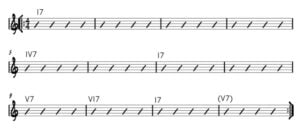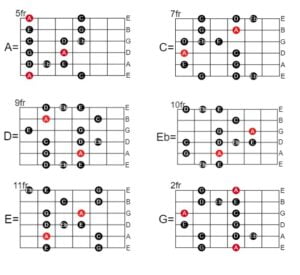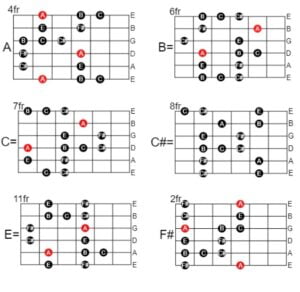
Table of Contents
GAIN THEORY OF BLUES
GAIN THEORY OF BLUE’S
The blues genre of music originated in the USA in the 19th century and was a form of music developed by African-Americans. It is described as a soulful and emotional music whose themes are primarily about the lives, loves, hardships and hopes of African-Americans.
Slowly the blues spread into urban areas which was mainly due to the fact that many rural blues musicians were leaving the countryside to find work in the factories of major cities. By 1920, three major formats of blues were common: The 8 bar blues, the 12 bar blues and the 16 bar blues. Blues also developed various styles, or subgenres, such as Mississippi Delta blues and Chicago electric blues.
Eight-Bar
In music, an eight-bar blues is a common blues chord progression. Music writers have described it as “the second most common blues form”[1] being “common to folk, rock, and jazz forms of the blues”.[2] It is often notated in 4/4
or 12/8
time with eight bars to the verse.
The 8 Bar Blue’s Form

12 Bar Blues
12 bar blues is a chord progression that defines the number of bars or measures in a typical blues song structure. In this lesson we are going to learn the standard blues progression
The 12 Bar Blue’s Form

BLUE’S SCALES – THE MAJOR AND MINOR BLUE’S SCALE
The blue’s scale is one of the first guitar scales we explore on the guitar when learning how to solo. The scale is used in many different styles of music, such as rock, blue’s, and jazz. There are 2 kinds of blue’s scales: the minor blues scale and the major blues scale.
The blue’s scale can be heard in legendary solos from players such as Wes Montgomery, Kenny Burrell, George Benson, and many more.
What is a blue’s scale?
The blues scale is a 6-note scale that contains 5 notes from the major or minor pentatonic scales plus one chromatic note.
What’s The Major Blues Scale?
The major blue’s scale is built by adding a b3 interval to the major pentatonic scale, forming the pattern 1-2-b3-3-5-6. This scale is used to solo over major, maj7, 7th chords and their related variations such as maj6, maj9, 9th, and 13th chords.
What’s The Minor Blues Scale?
The minor blue’s scale is built by adding a b5 interval to the minor pentatonic scale, forming the pattern 1-b3-4-b5-5-b7. This scale is used to solo over just about any chord or key including major keys, minor keys, major chords, minor chords, blues progressions, and more. It is the most versatile of all the modern scales.
The minor blues scale or “blue’s scale” or “pentatonic blues scale” contains the same notes as the minor pentatonic scale, including a flat fifth (b5) between the fourth and the sixth referred to as the “blue note”. This is what we call a hexatonic scale (made up of six notes). This scale is very popular in jazz music and widely used by jazz and blues musicians. The minor blues scale is easy to learn, easy to memorize and very useful when you want to bring blues lines to your jazz guitar improvisations.
MINOR BLUES SCALE FORMULA
The minor pentatonic blue’s scale formula is : tonic (1), minor third (b3), fourth (4), flat fifth (b5), fifth (5) and minor seventh (b7). Notice that the minor third (b3) can be considered as b10 or #9 just as the flat fifth (b5) can be thought as #4 or #11.
A Minor Blues Scale A C D Eb E G
Basically 6 notes in blue’s scale 1 b3 4 b5 5 B7
A Minor Blue’s Scale With 6 Position
A C D Eb E G

What’s The Major Blue’s Scale?
The A Major Blues Scale contains the following notes:
A – B – C – C# – E – F#
1 _ 2 _ b3 _ 3 _ 5 _ 6
For a complete lesson on the Major Blue’s Scale, read this lesson.
If you already know about the major blues scale and would just like to know how to play it in six positions as well as the open position of A, read on. This page includes notation/tabs and scale diagrams for each position along the fretboard.
A Major Blues Scale With 6 Position
A B C C# E F#

THANK YOU



